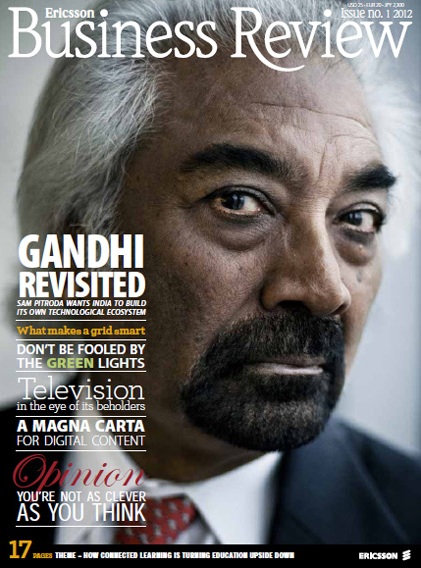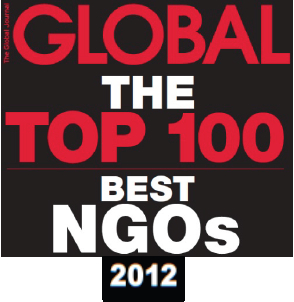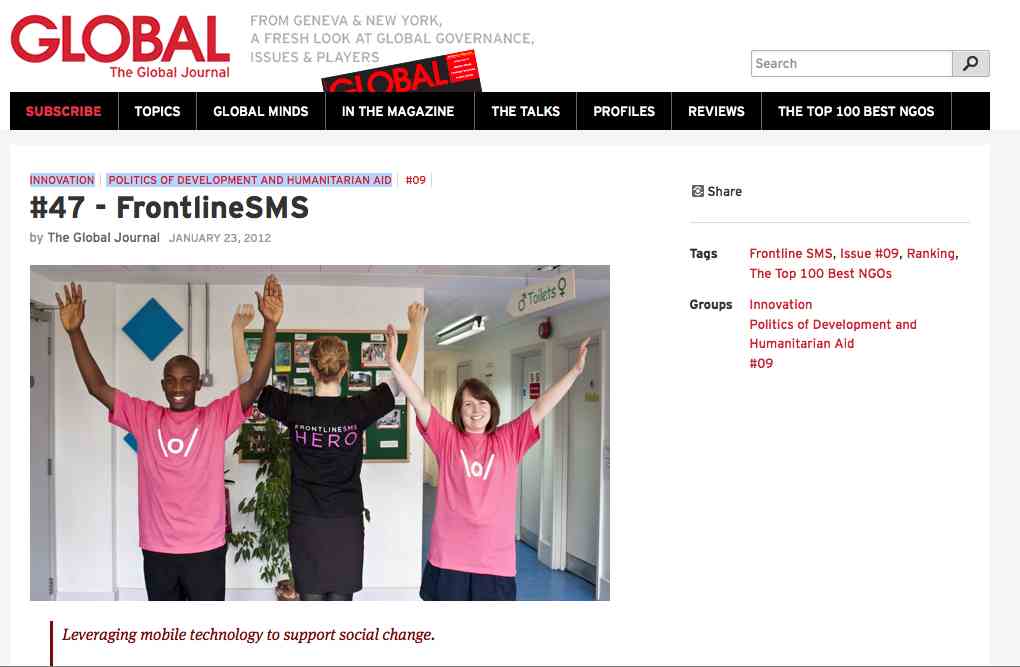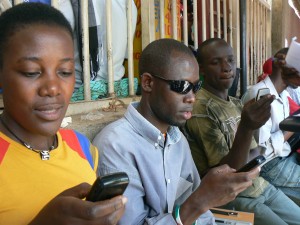FrontlineSMS featured in an Indian newspaper named The Financial Chronicle this week, in an article entitled At the Forefront of Development. You can read the article below, or view the print version of this article here [pdf].
By Brij Kothari, The Financial Chronicle

The hardware is rudimentary. An ordinary mobile phone connected to a laptop with a cable. But who would have thought that this simple set up could actually be turned into a central communication hub, and in the hands of civil society, become a powerful communication tool for people’s empowerment? Ken Banks’ FrontlineSMS, a free and open-source software, is allowing groups at the frontline of development to do some extraordinary things. And yet, all that FrontlineSMS does, is that it “enables users to send and receive text messages with groups of people through mobile phones”. Perhaps, the power of FrontlineSMS can be grasped best by the stories of its use in the hands of others.
A woman in rural India gets an SMS on her mobile Asurakshit din or “Unprotected day”. She is, thus, informed that she is likely to be fertile that day. The information is specifically intended to empower her to make a reproductive choice. Similar reminder SMSs ping through days eight-19 of her reproductive cycle, fertile days as per the Standard Days Method (SDM) of family planning, based on awareness of the menstrual cycle. How does CycleTel, an SMS-based system put in place by Georgetown University’s Institute for Reproductive Health (IRH), keep track of her cycle? The woman herself keeps CycleTel regularly informed of the onset of her cycle, simply by sending an SMS from her mobile to a dedicated number. FrontlineSMS provided the basic architecture upon which a more customised system is being developed through field trials.
HarassMap is a group in Egypt, started by two women who themselves faced harassment quite routinely on their way to and from work, that uses FrontlineSMS to capture the location and gravity of incidents of sexual harassment. The key idea is to get women to report harassment episodes in real time by sending an SMS to a dedicated number. Place and time information is then mapped with another amazing software, Ushahidi, to draw patterns from what would otherwise have been left as isolated data points. Hot spots are then targeted with community activism, awareness campaigns and tools to empower and support women individually and collectively.
In Nigeria, voters who also registered themselves as volunteers for the Network of Mobile Election Monitors (NMEM), took it upon themselves to SMS instantaneously into a FrontlineSMS central hub, any untoward incident of tampering or rigging they might observe. Human Emancipation Lead Project (HELP), a Nigerian NGO helped set up this citizen monitoring system, independent of the official monitoring groups and European Union observers. Observations by two or more volunteers in an area were verified, and if necessary, shared with the official monitoring agencies. Banks termed the Nigerian case a “breakthrough deployment” of FrontlineSMS.
FrontlineSMS was made available online as recently as 2005, and made open source two years later. In 2009, Banks hired his first employee. The spread of FrontlineSMS to more than 80 countries is, thus, nothing if not astonishing. A variety of uses by country popup on a world map at www.frontlinesms.com/frontlinesms-in-action/user-map/. With a strong presence in Africa, the top countries of deployment are Kenya, Uganda, and Tanzania. Banks offered three reasons, the last using a popular acronym of the Information and Communication Technologies for Development (ICT4D) community: “This is likely down to: a) Me having historically focused my blog and attention on Africa; b) FrontlineSMS being closely associated with the continent (the concept came out of field work in South Africa); and finally, c) There being a growing developer and ICT4D community on the continent (through innovation hubs, among others) keen to build on top of tools like ours.”
India, it would seem, is an ideal adoption ground for solutions like FrontlineSMS. Of the 1.2 billion population, only around 100 million have access to the internet, although, this is projected to grow to 300 million over the next three years. The mobile growth story is far ahead. The total subscriber base at the beginning of 2012 was 894 million, with an active subscriber base of 647 million. Wireless teledensity, the number of subscriptions per 100 people, was 161 in urban and 37 in rural areas. Several estimates put the number of smartphones in India at no more than 30 million, and one could safely assume, mostly in urban areas. The majority of active mobile handsets are, therefore, very basic but well-suited for voice and SMS. For civil society organisations working with low-income groups, in rural and urban areas alike, a platform like FrontlineSMS presents exciting communication possibilities.
As compared with African countries, the uptake of FrontlineSMS in India is still nascent. Lack of awareness may be the key issue. What would Banks like to see happen? “We’ve recently had user-organised meet ups in Haiti and Uganda, with others springing up around the world. It would be great to see this happening in India — our ethos and focus is that users should drive deployment of FrontlineSMS, and user-organised meetups are a large part of this.”
If you are using, or interested in using FrontlineSMS in India, then we'd love to hear from you! Please contact us to share your own questions and experiences.








